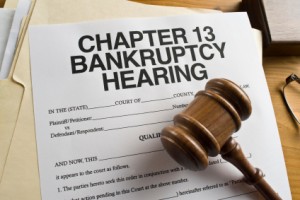
Note: All Orchard Bank credit cards are now issued by Capital One.
There are some extreme circumstances when you can apply for credit cards while in bankruptcy, but as a rule, the answer is no. If you file for a Chapter 7 bankruptcy, you can begin applying as soon as the debt is discharged. Chapter 13 bankruptcies are different.
The FREE credit card finder can give you access to online credit card quotes right now!
A Chapter 13 bankruptcy involves a repayment agreement; your debtors have allowed you to reduce the amount of money you pay against your true balance. In most cases, the interest owed is waived and only the principle is repaid. A trustee is assigned to your case and the payments are sent directly to them.
They must also approve any new credit requests. Since you are already in debt, acquiring new debt, especially credit cards is highly frowned upon. Your trustee will more than likely refuse unless you can justify the request.
A Chapter 7 bankruptcy is generally much more simple and straightforward. You submit every asset and the attorney reports your inability to repay your debts. The entire process takes less than three months, depending on certain factors. Once you appear before the judge, the decision is made and the debts are discharged. You are free from every debtor listed on the bankruptcy, but not future debt.
Rebuilding Credit after Bankruptcy
As soon as you receive your notification from the courts, either Chapter 7 or Chapter 13, advising of your discharge, you should begin to rebuild your credit. It will be a long process so it’s best to start right away. During the bankruptcy process, you were required to take a minimum of one finance management course, locate your goals, and review them daily.
To be successful in rebuilding your credit, you must have a new perspective and respect for the credit system.
If not, you will repeat the same mistakes and eventually, find yourself in the same situation, again. Next, you will need to review the damage done by the bankruptcy, this means accessing your credit report.
 Log onto Annualcreditreport.com and locate your state in the drop-down menu. Click and you are in. Complete the simple form and submit. Within seconds, your entire credit history is made available to you; print and save at least one hard copy. Review the data carefully and take special note of the accounts with negative or derogatory reports.
Log onto Annualcreditreport.com and locate your state in the drop-down menu. Click and you are in. Complete the simple form and submit. Within seconds, your entire credit history is made available to you; print and save at least one hard copy. Review the data carefully and take special note of the accounts with negative or derogatory reports.
The debtors from your bankruptcy will surely be listed at the top and will remain for years and you cannot dispute them. Concentrate on improving anything positive. If you have other assets listed, like your home or car, make sure these payments do not fall behind. When and if you are able, make double payments. Anything to build up your current credit positively will help.
Best Credit Cards for Rebuilding Credit after Bankruptcy
After filing for bankruptcy, you may be hesitant to apply for any new credit cards. This is understandable. However, you must have some level of credit today so rebuilding should begin immediately after your bankruptcy is complete. Start with secured credit cards with low credit balances and low APR or Annual Percentage Rate percentages.
Capital One and Orchard Bank both offer excellent secured credit card options. Depending on your needs, you can apply to either company. Some features from Capital One include, a refundable security deposit with a $3,000 maximum line of credit and automatic updates to all three credit bureaus.
Orchard Bank offers a low APR of 14.90% - 19.90% and excellent notification options to keep you aware of every transaction, payment due dates and more. This credit card company reports to all three credit bureaus. The application process is simple and because they are a secured credit card company, they are familiar with new customers who have previously filed bankruptcy.
Time Length Before Your Credit Score Improve
Your credit score will improve as your credit history and credit report improve; they are tied together. According to Experian.com, certain debts take longer to be removed from your credit history. This means what you reported during your bankruptcy plays a vital role in the length of time of each damaging item remains.
For example, anything listed as being delinquent can stay there for seven years and anything tax related lasts as much as 15 years. Most bankruptcies have a maximum of 10 years before they are removed. This does not mean that your credit score will remain low for the entire time; it just means you will need to work much harder to improve your number.
Try to find a credit counselor in your local area that can help you explain the specific changes you can make to your credit report that will increase your credit score.
Some things as simple as paying your bills on time can have monumental affects on your credit report. You may just have to wait it out. There is no fast remedy to improve your credit score; it takes time and patience.
Take a moment to use the FREE credit card chaser to find lot of credit card choices to help restore your credit today!
Similar Articles:
- Chapter 7 Bankruptcy
- Is learning how to pay off credit cards important?
- Chapter 13 Bankruptcy
- What can I do if I’m having problems paying credit cards?
- Would running up your credit cards before filing for bankruptcy be a good idea?
- Are credit cards a secured debt?
- What happens if you do not pay credit card debt?








